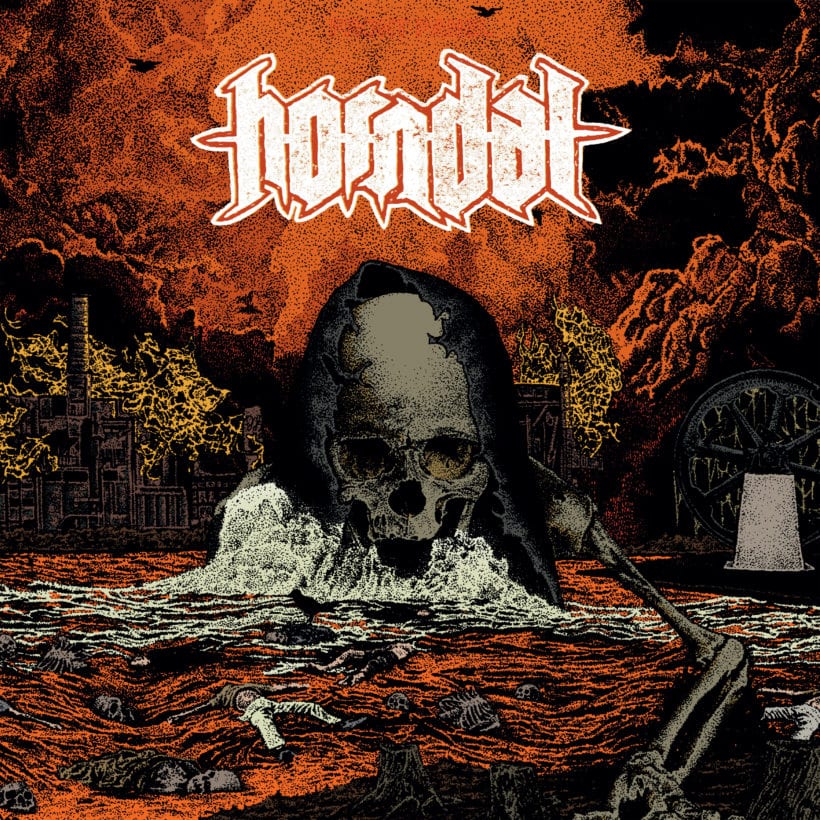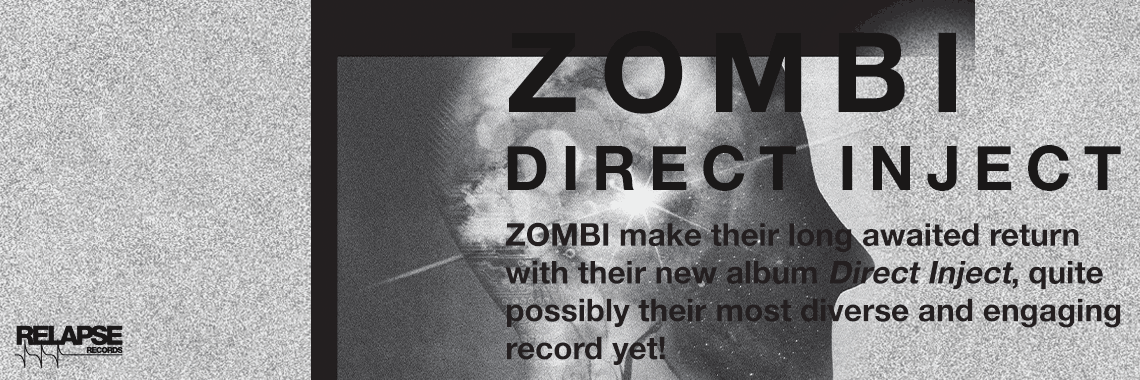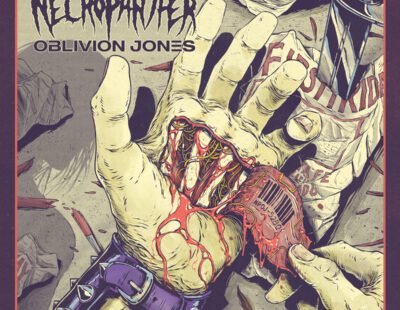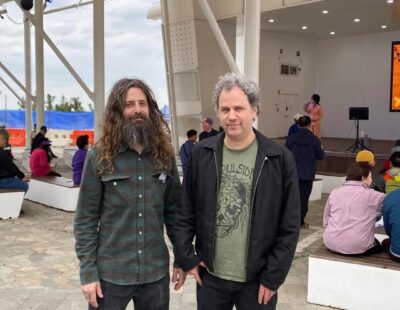
Horndal, Sweden is a small town in Europe but it’s eerily similar to countless ghost towns around the world. In 1979, the town’s steel mill closed shortly after the town’s saw mill suffered the same fate. The effects were clear: the small town’s population dwindled rapidly, totaling just over 1,100 people in 2010.
These events were the inspiration for sludge quartet Horndal, who take their name from the town drummer Pontus Levahn and his brother—vocalist and guitarist Henrik—grew up in. Their sophomore album Lake Drinker retells the town’s descent from industrial center to quiet ghost town, while drawing parallels to Horndal’s latest woes.
In 2017, Google bought 109 hectacres in Horndal with the intention of using the space for server and data centers. Decibel spoke to Pontus Levahn about the town Horndal’s past and present, as well as the video for the band Horndal’s latest video, “Rossen,” which can be seen below.
Lake Drinker is out now on Prosthetic.
Horndal is a really small town in Sweden. It’s a post-industrial town, so it used to have a steel mill that employed almost the entire population, so it used to be 3,000 people, something like that. In the late ’70s, they decided to close the steel mill and that was just two weeks after they closed the saw mill, which was way smaller but still an important employer in the hometown.
In three weeks, they shut down all the industries and everyone became out of work, just like that. It had a huge effect on the town and there was a lot of protest in this town. There was a lot of despair and people were desperate.
When we grew up—my brother is older than I, he was around when all this happened. I was born shortly after, so when I grew up, I grew up in a ghost town not knowing anything else. We realized when we got older, that old story and the protest surrounding it is pretty interesting and a pretty dark story fit to tell in metal music. We sort of had the idea for the band before we had the songs. Then we just started writing and it poured out of us, sort of.
Growing up, did you realize that you were in a ghost town or was that just normal for you?
I didn’t know anything else, so that was completely normal to me. Our parents, they were teachers, there were so many families that were forced to move. There were way fewer kids in their classes, so after a while they looked for work in other nearby towns. After a while, we moved, not very far but closer to the bigger city. It was then, when I lived there, that I understood. We came back and visited friends in Horndal and that was when I realized that there’s nothing here, there’s nothing left. There used to be banks and stores and hairdressers and all kinds of stuff, but it was all gone.
One thing, around the protests when they were shutting the steel mill, they were setting up this theater play. It’s a very ’70s way of protesting, but that’s what they did. Our parents were in that play. Our dad played the devil coming to Horndal to crush the steel mill and take the money and leave the community to its fate. That really inspired us as well. That whole story, it’s very political and very angry, but it’s very metal too.
There are parallels today. Google is looking to set up shop in Horndal right now and, in doing that, they want to operate in areas of nature that have been in your town forever. Are you seeing parallels to what your father experienced when the mills closed down?
Definitely. This is the biggest thing that has happened to Horndal since the closure of the steel mill. Some people are very hopeful as well; they hope that Google coming might bring some hope, but no one knows how many jobs it would actually create. It’s server hosts and it’s not like the whole town gets a job or it can grow very much. In a week or 10 days, they’re going to court and it gets decided if they can build server facilities or not. It’s been a lot of trouble on the way; they have chopped down forest there, a lot of trees, so that’s already done. The plan is to take cooling water, because they need a lot of cooling water, and they want to take it from the local lake that everyone swims in and fishes in.
It’s been a lot of suspicion about how that will affect nature and the lake. It could be very harmful so now they’re looking at other water. There’s a river a couple miles away, so it’s huge pipelines they have to dig into the ground.
To answer your question, yeah, there’s a lot of parallels, only this time they’re building something. Not everyone is so sure that it will be positive in the end.
That’s a topic that came up when Amazon was talking about building new locations. They’re promising these jobs and that they’ll be good for people, but who’s to say it will be people form that town or area? They may just bring in people with more specialized skills. There’s no guarantee it will help.
Exactly, and for Amazon, they’re building those slavery places. But Google, they’re going to build in people who know how to build a server facility and then most of it is not run locally. But it’s a double edged sword. Me, as Pontus Levahn, a human being, I love my hometown so much and I just want it to finally get to flourish. I’m super hopeful and I want this to become something good but I’m waiting to see how it will play out.And also as a songwriter and a storyteller, it has a lot of angles that are very interesting for making a new type of ghost story based on true events. It’s kind of weird but we will definitely see. I think they will get approval but I don’t know.
When you wrote this album, Lake Drinker, did you want to draw people’s attention to these stories and enact some type of change, or were you setting out to document your hometown?
It’s both. An old friend of mine, we met up when we had a small release party in Horndal for the previous record, we knew the plans were there for Google. He was talking about Rossen, which is the name of the lake they want to take the water from. He was like, “We’ll see. Hopefully it can create some jobs, but they should stay the fuck away from Rossen,” talking about the lake and it was something that was really inspiring.
Music, I think it’s a good way of getting a message across. I think we shouldn’t be so naive with—all kinds of companies, it’s not like they’re coming to save communities or people. It’s business; for Google, in Sweden we have a lot of clean energy so that’s good for them. It’s business. People should not be so naive. We should beware and if we can get critical thoughts out there, if it happens, it could become a better thing and they could definitely put pressure on the town and on the city hall and on Google itself.
I just want this to become as good as possible for Horndal, and at the same time, it’s a pretty great narrative for a dark metal album. To us, it just felt like a perfect sophomore album.
The whole story is a very metal thing or a very dark thing. Similar things happening twice makes it so much more of a story.
Horndal is a very small place, but there are Horndals all over the world. There are so many people coming from these kinds of places. It’s not a Swedish thing. Old towns that used to have steel mills or any kind of industry where they shut down the factories. That’s been experienced in the US, all the rust belts, and in Northern England and in Germany. We have people all the time writing us, saying “I come from a former mining town in South America and I can relate to what you’re saying.”
We just felt that if we write stuff that is very personal to us and very local, it will automatically become something global that people can relate to. Even though it’s really small, really local, at the same time very universal.
I live in Philadelphia, which is in Pennsylvania, so outside of the city there are many, many parts of the state that were affected by factory closures and things like that. Plenty of ghost towns, steel and coal related things. It certainly is something that I think people around the world feel. It may be a very small microcosm of that town specifically, but the story is so much bigger.
It’s sort of like we’re looking upon the world through Horndal. That’s our filter, we just realized that this story, you can find them on a bigger scale out there in the world. At first, we were kind of “OK, maybe we just have one album to write about this,” but we understood this is a very human and personal aspect to it. It will resonate with people from many other places.
In many ways, it’s much darker than writing about Satan because these are things that affect so many people’s lives.
We’ve never had to write songs about dragons or swords or wars or demons because we have the demons right there.
We’re premiering the video for “Rossen,” which is an animated video. Where did your idea to do it this way come from, doing it as an animated video in this really dark style?
The director is called Kalle Haglund and he’s really talented. He’s done really cool videos for The Hives, for instance, and they come from a town that’s really close to Horndal. I just reached out to him because I thought that he would totally understand the whole thing. The town that he comes from is sort of similar, it’s a steel town.
Right off the bat, he came back to us and said, “I love the record, I really want to do this.” His idea was that “What if, from the old steel mill, there’s one worker left behind. Just imagine that it’s not gone 40 years but maybe hundreds of years and he’s become this weird figure that is running around in the old factory.”
It sounded so scary and I was laughing at the same time when he was explaining the idea. What if he just sends in lake water, taking over the steel mill, and then he gets crucified upside down in the ending.
Always with us, we have true stories and stuff inspired by true events, but at the same time, it’s this sort of ghost story feel. You see in the framed photos in the beginning, those are real workers from the steel mill. We had permission to use them, so it’s some reality but at the same time, we have this weird, fucked up ghost story merging them together.







